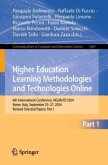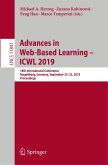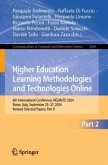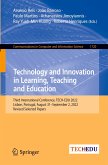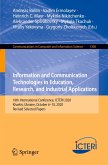Technology and Innovation in Learning, Teaching and Education
4th International Conference, TECH-EDU 2024, Abu Dhabi, United Arab Emirates, November 13-15, 2024, Revised Selected Papers, Part I
Herausgegeben:Reis, Arsénio; Cravino, José P.; Hadjileontiadis, Leontios; Martins, Paulo; Dias, Sofia B.; Hadjileontiadou, Sofia; Mikropoulos, Tassos
Technology and Innovation in Learning, Teaching and Education
4th International Conference, TECH-EDU 2024, Abu Dhabi, United Arab Emirates, November 13-15, 2024, Revised Selected Papers, Part I
Herausgegeben:Reis, Arsénio; Cravino, José P.; Hadjileontiadis, Leontios; Martins, Paulo; Dias, Sofia B.; Hadjileontiadou, Sofia; Mikropoulos, Tassos
- Broschiertes Buch
- Merkliste
- Auf die Merkliste
- Bewerten Bewerten
- Teilen
- Produkt teilen
- Produkterinnerung
- Produkterinnerung
The three-volume set CCIS 2479-2481 constitutes the proceedings of the 4th International Conference on Technology and Innovation in Learning, Teaching and Education, TECH-EDU 2024, held in Abu Dhabi, United Arab Emirates, during November 13 15, 2024.
The 79 full papers presented in this volume were carefully reviewed and selected from 167 submissions. The papers are organized in the following topical sections:
Part I: Artificial Intelligence in Education; Emerging Technologies and Learning Environments.
Part II: Open Education, Digital Resources and Online Assessment; Pedagogical and Curricular Innovation.…mehr
Andere Kunden interessierten sich auch für
![Technology and Innovation in Learning, Teaching and Education Technology and Innovation in Learning, Teaching and Education]() Technology and Innovation in Learning, Teaching and Education65,99 €
Technology and Innovation in Learning, Teaching and Education65,99 €![Higher Education Learning Methodologies and Technologies Online Higher Education Learning Methodologies and Technologies Online]() Higher Education Learning Methodologies and Technologies Online98,99 €
Higher Education Learning Methodologies and Technologies Online98,99 €![Advances in Web-Based Learning - ICWL 2019 Advances in Web-Based Learning - ICWL 2019]() Advances in Web-Based Learning - ICWL 201950,99 €
Advances in Web-Based Learning - ICWL 201950,99 €![Higher Education Learning Methodologies and Technologies Online Higher Education Learning Methodologies and Technologies Online]() Higher Education Learning Methodologies and Technologies Online65,99 €
Higher Education Learning Methodologies and Technologies Online65,99 €![Technology and Innovation in Learning, Teaching and Education Technology and Innovation in Learning, Teaching and Education]() Technology and Innovation in Learning, Teaching and Education57,99 €
Technology and Innovation in Learning, Teaching and Education57,99 €![Technology and Innovation in Learning, Teaching and Education Technology and Innovation in Learning, Teaching and Education]() Technology and Innovation in Learning, Teaching and Education68,99 €
Technology and Innovation in Learning, Teaching and Education68,99 €![Information and Communication Technologies in Education, Research, and Industrial Applications Information and Communication Technologies in Education, Research, and Industrial Applications]() Information and Communication Technologies in Education, Research, and Industrial Applications38,99 €
Information and Communication Technologies in Education, Research, and Industrial Applications38,99 €-
-
-
The three-volume set CCIS 2479-2481 constitutes the proceedings of the 4th International Conference on Technology and Innovation in Learning, Teaching and Education, TECH-EDU 2024, held in Abu Dhabi, United Arab Emirates, during November 13 15, 2024.
The 79 full papers presented in this volume were carefully reviewed and selected from 167 submissions. The papers are organized in the following topical sections:
Part I: Artificial Intelligence in Education; Emerging Technologies and Learning Environments.
Part II: Open Education, Digital Resources and Online Assessment; Pedagogical and Curricular Innovation.
The 79 full papers presented in this volume were carefully reviewed and selected from 167 submissions. The papers are organized in the following topical sections:
Part I: Artificial Intelligence in Education; Emerging Technologies and Learning Environments.
Part II: Open Education, Digital Resources and Online Assessment; Pedagogical and Curricular Innovation.
Produktdetails
- Produktdetails
- Communications in Computer and Information Science 2479
- Verlag: Springer / Springer Nature Switzerland / Springer, Berlin
- Artikelnr. des Verlages: 89520061, 978-3-032-02674-3
- Seitenzahl: 396
- Erscheinungstermin: 22. August 2025
- Englisch
- Abmessung: 235mm x 155mm x 22mm
- Gewicht: 599g
- ISBN-13: 9783032026743
- ISBN-10: 3032026741
- Artikelnr.: 74898277
- Herstellerkennzeichnung
- Springer-Verlag GmbH
- Tiergartenstr. 17
- 69121 Heidelberg
- ProductSafety@springernature.com
- Communications in Computer and Information Science 2479
- Verlag: Springer / Springer Nature Switzerland / Springer, Berlin
- Artikelnr. des Verlages: 89520061, 978-3-032-02674-3
- Seitenzahl: 396
- Erscheinungstermin: 22. August 2025
- Englisch
- Abmessung: 235mm x 155mm x 22mm
- Gewicht: 599g
- ISBN-13: 9783032026743
- ISBN-10: 3032026741
- Artikelnr.: 74898277
- Herstellerkennzeichnung
- Springer-Verlag GmbH
- Tiergartenstr. 17
- 69121 Heidelberg
- ProductSafety@springernature.com
.- Artificial Intelligence in Education.
.- Understanding AI Integration Challenges in Education: A Brief Systematic Literature Review.
.- Unlocking the Potential of Large Language Models for AI-Assisted Medical Education: A Case Study with ChatGPT.
.- Leveraging Generative Artificial Intelligence for Analyzing Handwritten Chemistry Notes: A chatbot support for Students queries.
.- Enhancing Computer Programming Education: Integrating Advanced AI Tools for Challenging Curriculum Projects.
.- Artificial Intelligence and Machine Learning in Primary Education: A Case Study in Portugal.
.- Improving Teaching with Artificial Intelligence Scaffolding in Physics Education with GPT.
.- Integrating Computational Thinking and Artificial Intelligence into Mathematics Education: A Pathway for the 21st Century.
.- The Impact of Artificial Intelligence on Flipped and Online Learning.
.- Personalization of a learning environment supported by AI for vocational training based on skills required: A research proposal.
.- Large Language Models and Intelligent Agents in Education.
.- Course design with artificial intelligence agents.
.- Emerging Technologies and Learning Environments.
.- The Degree of Contribution of Smart Digital learning Platforms to the Development of Entrepreneurship: the KKUx Platform as a Model.
.- Arabic-Indonesian Translation Errors: An Analysis of Google Translate for Arabic Language Students.
.- Electromagnetic waves all around us. Put your glasses on and sense them.
.- Driving Engagement in Learning: Exploring the Impact of an Augmented Reality Mobile Application for Astronomy Education.
.- Exploring the impact of modern board game and video game playing frequency on critical thinking.
.- Serious Game Design for Green Mobility: A Lean Inception Approach.
.- Digital games instrumental orchestrations to enhance integral calculus learning a case study.
.- How museums are changing their visitors experience with new formats and approaches to digital storytelling.
.- Teaching Programming with Makey Makey in Lower Secondary School.
.- Learning design integrating a gamified Augmented Reality application.
.- Towards Meaningful Learning: a Home-Grown Approach to Teaching and Learning in Developing Country.
.- EduGenZ: A gamified educational framework for GenZ using affective and immersive technology.
.- Taking a Flight with Drones in STEM Education: Benefits, Affordances, Facilitating Factors and Challenges.
.- Students as Users of Augmented Reality Glasses: Their Experiences and Perceptions.
.- MindOfMine v.2: Towards a Closed-Loop Serious Game Platform for Personalized Cognitive Enhancement in Mental Disorders.
.- Educational Robotics to support Kindergarten Student s Problem-Solving Skills: a case study.
.- Guidelines for Using Mixed Reality to Teach STEM Subjects.
.- Understanding AI Integration Challenges in Education: A Brief Systematic Literature Review.
.- Unlocking the Potential of Large Language Models for AI-Assisted Medical Education: A Case Study with ChatGPT.
.- Leveraging Generative Artificial Intelligence for Analyzing Handwritten Chemistry Notes: A chatbot support for Students queries.
.- Enhancing Computer Programming Education: Integrating Advanced AI Tools for Challenging Curriculum Projects.
.- Artificial Intelligence and Machine Learning in Primary Education: A Case Study in Portugal.
.- Improving Teaching with Artificial Intelligence Scaffolding in Physics Education with GPT.
.- Integrating Computational Thinking and Artificial Intelligence into Mathematics Education: A Pathway for the 21st Century.
.- The Impact of Artificial Intelligence on Flipped and Online Learning.
.- Personalization of a learning environment supported by AI for vocational training based on skills required: A research proposal.
.- Large Language Models and Intelligent Agents in Education.
.- Course design with artificial intelligence agents.
.- Emerging Technologies and Learning Environments.
.- The Degree of Contribution of Smart Digital learning Platforms to the Development of Entrepreneurship: the KKUx Platform as a Model.
.- Arabic-Indonesian Translation Errors: An Analysis of Google Translate for Arabic Language Students.
.- Electromagnetic waves all around us. Put your glasses on and sense them.
.- Driving Engagement in Learning: Exploring the Impact of an Augmented Reality Mobile Application for Astronomy Education.
.- Exploring the impact of modern board game and video game playing frequency on critical thinking.
.- Serious Game Design for Green Mobility: A Lean Inception Approach.
.- Digital games instrumental orchestrations to enhance integral calculus learning a case study.
.- How museums are changing their visitors experience with new formats and approaches to digital storytelling.
.- Teaching Programming with Makey Makey in Lower Secondary School.
.- Learning design integrating a gamified Augmented Reality application.
.- Towards Meaningful Learning: a Home-Grown Approach to Teaching and Learning in Developing Country.
.- EduGenZ: A gamified educational framework for GenZ using affective and immersive technology.
.- Taking a Flight with Drones in STEM Education: Benefits, Affordances, Facilitating Factors and Challenges.
.- Students as Users of Augmented Reality Glasses: Their Experiences and Perceptions.
.- MindOfMine v.2: Towards a Closed-Loop Serious Game Platform for Personalized Cognitive Enhancement in Mental Disorders.
.- Educational Robotics to support Kindergarten Student s Problem-Solving Skills: a case study.
.- Guidelines for Using Mixed Reality to Teach STEM Subjects.
.- Artificial Intelligence in Education.
.- Understanding AI Integration Challenges in Education: A Brief Systematic Literature Review.
.- Unlocking the Potential of Large Language Models for AI-Assisted Medical Education: A Case Study with ChatGPT.
.- Leveraging Generative Artificial Intelligence for Analyzing Handwritten Chemistry Notes: A chatbot support for Students queries.
.- Enhancing Computer Programming Education: Integrating Advanced AI Tools for Challenging Curriculum Projects.
.- Artificial Intelligence and Machine Learning in Primary Education: A Case Study in Portugal.
.- Improving Teaching with Artificial Intelligence Scaffolding in Physics Education with GPT.
.- Integrating Computational Thinking and Artificial Intelligence into Mathematics Education: A Pathway for the 21st Century.
.- The Impact of Artificial Intelligence on Flipped and Online Learning.
.- Personalization of a learning environment supported by AI for vocational training based on skills required: A research proposal.
.- Large Language Models and Intelligent Agents in Education.
.- Course design with artificial intelligence agents.
.- Emerging Technologies and Learning Environments.
.- The Degree of Contribution of Smart Digital learning Platforms to the Development of Entrepreneurship: the KKUx Platform as a Model.
.- Arabic-Indonesian Translation Errors: An Analysis of Google Translate for Arabic Language Students.
.- Electromagnetic waves all around us. Put your glasses on and sense them.
.- Driving Engagement in Learning: Exploring the Impact of an Augmented Reality Mobile Application for Astronomy Education.
.- Exploring the impact of modern board game and video game playing frequency on critical thinking.
.- Serious Game Design for Green Mobility: A Lean Inception Approach.
.- Digital games instrumental orchestrations to enhance integral calculus learning a case study.
.- How museums are changing their visitors experience with new formats and approaches to digital storytelling.
.- Teaching Programming with Makey Makey in Lower Secondary School.
.- Learning design integrating a gamified Augmented Reality application.
.- Towards Meaningful Learning: a Home-Grown Approach to Teaching and Learning in Developing Country.
.- EduGenZ: A gamified educational framework for GenZ using affective and immersive technology.
.- Taking a Flight with Drones in STEM Education: Benefits, Affordances, Facilitating Factors and Challenges.
.- Students as Users of Augmented Reality Glasses: Their Experiences and Perceptions.
.- MindOfMine v.2: Towards a Closed-Loop Serious Game Platform for Personalized Cognitive Enhancement in Mental Disorders.
.- Educational Robotics to support Kindergarten Student s Problem-Solving Skills: a case study.
.- Guidelines for Using Mixed Reality to Teach STEM Subjects.
.- Understanding AI Integration Challenges in Education: A Brief Systematic Literature Review.
.- Unlocking the Potential of Large Language Models for AI-Assisted Medical Education: A Case Study with ChatGPT.
.- Leveraging Generative Artificial Intelligence for Analyzing Handwritten Chemistry Notes: A chatbot support for Students queries.
.- Enhancing Computer Programming Education: Integrating Advanced AI Tools for Challenging Curriculum Projects.
.- Artificial Intelligence and Machine Learning in Primary Education: A Case Study in Portugal.
.- Improving Teaching with Artificial Intelligence Scaffolding in Physics Education with GPT.
.- Integrating Computational Thinking and Artificial Intelligence into Mathematics Education: A Pathway for the 21st Century.
.- The Impact of Artificial Intelligence on Flipped and Online Learning.
.- Personalization of a learning environment supported by AI for vocational training based on skills required: A research proposal.
.- Large Language Models and Intelligent Agents in Education.
.- Course design with artificial intelligence agents.
.- Emerging Technologies and Learning Environments.
.- The Degree of Contribution of Smart Digital learning Platforms to the Development of Entrepreneurship: the KKUx Platform as a Model.
.- Arabic-Indonesian Translation Errors: An Analysis of Google Translate for Arabic Language Students.
.- Electromagnetic waves all around us. Put your glasses on and sense them.
.- Driving Engagement in Learning: Exploring the Impact of an Augmented Reality Mobile Application for Astronomy Education.
.- Exploring the impact of modern board game and video game playing frequency on critical thinking.
.- Serious Game Design for Green Mobility: A Lean Inception Approach.
.- Digital games instrumental orchestrations to enhance integral calculus learning a case study.
.- How museums are changing their visitors experience with new formats and approaches to digital storytelling.
.- Teaching Programming with Makey Makey in Lower Secondary School.
.- Learning design integrating a gamified Augmented Reality application.
.- Towards Meaningful Learning: a Home-Grown Approach to Teaching and Learning in Developing Country.
.- EduGenZ: A gamified educational framework for GenZ using affective and immersive technology.
.- Taking a Flight with Drones in STEM Education: Benefits, Affordances, Facilitating Factors and Challenges.
.- Students as Users of Augmented Reality Glasses: Their Experiences and Perceptions.
.- MindOfMine v.2: Towards a Closed-Loop Serious Game Platform for Personalized Cognitive Enhancement in Mental Disorders.
.- Educational Robotics to support Kindergarten Student s Problem-Solving Skills: a case study.
.- Guidelines for Using Mixed Reality to Teach STEM Subjects.



